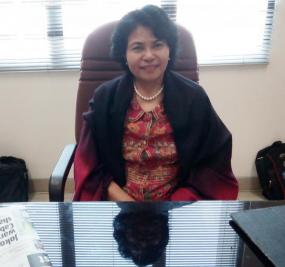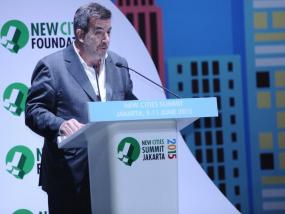The International Labour Organization (ILO) Jakarta Office on July 9 launched its annual report “Labour and Social Trends in Indonesia 2014-2015: Strengthening Competitiveness and Productivity Through Decent Work”.
Emma Allen, a labor market economist for the ILO in Jakarta, and author of the report, discussed with Strategic Review what the seventh issue of the “Labour and Social Trends” series means for Indonesia’s economic future.
She was joined by her colleagues Robert Kyloh, Senior Specialist for Multilateral Cooperation, ILO Geneva; and Michiko Miyamoto, Officer in Charge, Country Office for Indonesia and Timor-Leste.
The ILO is a United Nations agency. It deals with labor issues, particularly international labor standards, social protection and work opportunities for all. In 1969, it won the Nobel Peace Prize for “improving peace among classes, pursuing decent work and justice for workers, and providing technical assistance to other developing nations”.
1. Indonesian economic growth during the first quarter of 2015 slowed to 4.71 percent, yet employment figures are going up. What does this say about the connection between the labor market and economic growth?
Emma Allen: I think the part of it is about the composition of the growth. We can see that employment has been growing in the manufacturing sector and one of the things about the slowing of economic growth is that one of the key sectors that slowed has been the mining sector, which is traditionally quite capital intensive. It does not employ many workers in comparison to the other sectors of the economy.
With the mining sector and exports associated with it constricting a little bit, that’s why we have seen slowing growth. But at the same I think a lot of efforts over the past couple years have been to stimulate the manufacturing sector, and I think that all of those efforts have been made by policymakers so a lot of jobs are coming from that area.
Robert Kyloh: If we look over the last 10 years Indonesia has done quite well. It has robust economic growth. The rate of growth of employment has been modest but has been positive, and what’s most important from the analysis that Emma did is that proportionally “good jobs” in the total jobs have been increasing not decreasing.
Everywhere in the world there is growth of contracting work, of part time work and outsourcing, but what we see in Indonesia, surprisingly, is the proportion of regular jobs in the total is actually going up not down. That’s quite an achievement in the environment that has existed globally for the last decade.
If economic growth slows, as it has to 4.7 percent, there will be some pressure on the labor market. That’s why we, like other people, think the government is right to be focusing on how it can achieve faster growth in manufacturing. We are just not sure that the labor market is the major constraint on growth of the manufacturing sector.
I have talked to lots of investors, here and foreign direct investors, and they tell us labor costs are not really a big issue; labor regulations are not really a big issue. The issue is to do with infrastructure, is to do with the overall level of certainty in the business world. But labor issues don’t figure highly in the decision about whether they choose Indonesia, Vietnam or Cambodia. The labor issue is only the skill issue, which is the same as other countries in the region.
2. How do you see the Indonesian labor market’s competitiveness in relation to the ASEAN Economic Community 2015?
Emma Allen: ILO analysis on the ASEAN Economic Community and those associated with it sees an opening up of the Indonesian economy. ILO economic modeling indicates that there will be aggregate gains in terms of economic growth and employment growth, so I think Indonesia is already in a comparatively better position than other countries.
Michiko Miyamoto: Another point to add is that with many middle-income countries the productivity and competitiveness of the small to medium sized enterprises is often the worry. And that’s also that case for Indonesia, because larger firms they are talking about skills they should have, they have better training systems, better access to capital etc. But the majority of the jobs and the majority of the economy are run by small to medium sized enterprises. So their competitiveness is going to make a huge difference to how the country can actually compete.
I remember reading a survey where most of the concerns [about the AEC] are coming from that side, especially local small scale, mid-scale and enterprises, and whether they are confident enough to be able to compete, or not so able to invest in terms of creating an enabling environment for them to grow further, so that’s an important aspect.
3. Your report shows that 51.7 percent of regular employees earn less than the provincial minimum wage. What should be done to make the situation fairer?
Robert Kyloh: One of the big problems is after the announcement of the new minimum wage for a province or for a district; there is a provision that allows employers to postpone the increase. And that provision seems to get used a lot, so a governor announces a new minimum wage to apply from the start of 2015. Employers then make an application and there is a delay of that increase until 2016. I do not know any other country where that happens. Normally the minimum wage adjustment is implemented immediately and fully.
Emma Allen: I think from the employers’ perspective, what I would like is for the minimum wage to be simple, reliable and fair. Reliable means, if I am an employer, I am doing my books every year and I am thinking about the sustainability of my enterprise, and I would like to be able to have a systematic and predictable adjustment of the minimum wage for every year.
Employers say the minimum wage system in Indonesia is quite complex and maybe it would be better for everyone to switch to a simple system. The idea of making it simple is something the employers will be very interested in. Fairness is also a very important component.
Now if I think about it from the workers perspective, then the workers are interested in having and promoting workers’ welfare, and to be able to have a decent living standard. I remember our colleague from the KSPI [the Confederation of Indonesian Workers] was arguing that the wage system in Indonesia is not yet providing an adequate living standard.
This is the dialogue that needs to happen between workers, employers and government and they need to really engage in stronger dialogue over time to be able to properly come to an agreement on what is a decent wage for everybody. Part of that is going to be related to the minimum wage system, and it also needs to be related to the issue of collective bargaining.
Collective bargaining is quite limited in Indonesia and we would like to expand it. It is important for reducing income inequality and improving the standard of living for Indonesians.
Robert Kyloh: There is the whole issue of how do we get compliance, and there are a lot different ways. In Indonesia we have centralized and decentralized labor officers, and part of their job is labor inspection; to go around and check whether the regulations are being complied with.
That system could be made more visible, more transparent. The unions could be given a bigger role in checking themselves to see if the minimum wage is being applied. If they are allowed to go to a factory and check that all the workers have received what they are legally entitled to in the last month, that might help.
4. Indonesian is rapidly urbanizing, which is contributing significantly to economic growth. How do we develop the rural areas and reduce rural poverty?
Emma Allen: I think we know that Indonesia is one of the most rapidly urbanizing nations in the world. I have the specific statistics in my report, but I think 68 percent of Indonesians will be urbanites by 2030. So I think one of the keys is going to be creating jobs in rural areas, and supporting income equality in rural areas. Rural economies are typically not very diverse, largely based on the agriculture sector, the structure is more homogenous. If you want to promote development in rural areas, then I think the ILO would probably recommend looking at the value chain, and looking at the transport systems.
Robert Kyloh: Poverty is concentrated in the rural areas, so we are concerned about rural areas and not just workers that work in the factories. This is why we put a lot of emphasis on the social security system, and the government has been making good progress in the area of support for the very poor. We would like to see the revenue that has been saved since the fuel subsidy changes, a good proportion of that, spent on poverty eradication.
Indonesia has a good record on reducing poverty. The poverty line in Indonesia is very, very low, it works out at something like 75 cents a day, so there are a lot of people concentrated just above the poverty line. So, to continue to fund those programs, the government itself, would be something the ILO strongly recommends.
5. The report says that the number of women workers is declining. How can this be reversed?
Emma Allen: Women’s labor participation is really low, and most of the time women are not participating in the labor force because they are undertaking full time housekeeping activities. Now, from my perspective, these women are not participating in the labor force, and to me as an economist, that means you are missing out on the productive potential; unutilized labor. Perhaps if we could utilize that labor more then that has the potential to contribute more to economic growth and the development of the Indonesian economy.
So, I would really encourage increasing women’s participation in the labor force. Maybe they need some help to support them, so if you have a family, things like flexible work time arrangements can be helpful. Childcare or free childcare can help women. Aside from that, I think women might have a comparatively lower level of educational attainment, so perhaps they do need some type of training programs that can give them a little bit more capability for entering the labor market.










 resized.png)
